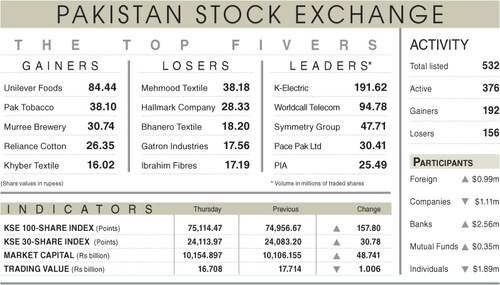KARACHI: The government borrowed more than the target on Wednesday and reduced rates by up to 60 basis points at the auction of treasury bills.
The bid pattern suggested banks were eager to park maximum liquidity for longer tenor as the interest rate looks to fall in the next monetary policy due in June amid continued deceleration in inflation, which is expected to slow to 13-15pc in May.
According to the State Bank of Pakistan (SBP), the government raised Rs500.5 billion, exceeding the Rs360 billion target. It has been borrowing aggressively to meet the growing spending needs. The investors offered a total of Rs1,184.8bn in bids, indicating their eagerness to invest before the interest rate yield falls.
There is a visible indicator that the interest rate is bound to come down, as the CPI-based inflation, estimated by the Ministry of Finance, could be in the range of 13.5 to 14.5pc for May from 17.3pc in April.
Raises Rs500bn, exceeding auction target
The SBP maintained its policy rate at 22pc to counter inflation, which rose to as high as 37pc and remained around 30pc for most of FY24. The inflation decelerated to 17.3pc in April, but the central bank surprised the market by leaving its policy rate unchanged in the last monetary policy review, drawing sharp criticism from stakeholders, particularly trade and industry.
By keeping the borrowing cost high, economic growth was compromised due to no domestic investments, and growth may be around 2pc in FY24.
Announcing the auction result, the SBP said the government raised Rs122.4bn for a 3-month tenor, Rs70.4bn for a 6-month, and Rs182.9bn for a 12-month against the bids of Rs390.6bn, Rs255bn, and Rs539bn, respectively. However, the government slashed the cut-off yields on 3-month papers by 60 basis points to 21pc, 29bps for 6-month papers to 21pc, and 31bps for 12-month bills to 20.1pc.
If the inflation slows to 13.5 to 14.5pc in May, the gap with interest rate would be around 7.5-8.5pc, creating room for a 300bps reduction in the policy rate.
Analysts are sure to see a significant cut in the interest rate, but they say the State Bank’s overcautious approach, driven by the IMF’s interference, could be surprising again.
This higher interest rate overburdened the government due to costly bank borrowing. According to the Ministry of Finance’s mid-year report, Pakistan’s debt servicing cost rose by more than 64pc in the outgoing fiscal year, massively outpacing the revenue growth of 30pc.
Published in Dawn, May 30th, 2024














































Dear visitor, the comments section is undergoing an overhaul and will return soon.